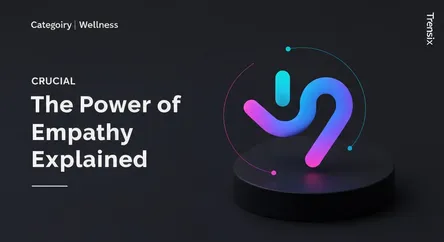Wellness
The Power of Empathy Explained

Discover what empathy is, why it's a vital mindfulness skill, and how it improves our relationships, communication, and overall well-being.
What is it?
Empathy is the ability to recognize, understand, and share the thoughts and feelings of another person. It's often described as the experience of "walking in someone else's shoes" to comprehend their emotional state and perspective. Psychologists identify different types, including cognitive empathy (understanding another's feelings on an intellectual level) and emotional empathy (physically feeling what another person feels). This skill is fundamental for building relationships and behaving compassionately, as it enables helping behaviors that are internally motivated. It goes beyond sympathy, which is feeling sorry for someone, by involving a shared emotional experience.
Why is it trending?
In an increasingly disconnected world, there is a growing focus on mental wellness and meaningful social bonds, placing empathy at the forefront. As a core component of emotional intelligence, it's recognized as a crucial skill for reducing stress and enhancing emotional awareness. The emphasis on mindfulness has highlighted empathy's role in fostering genuine connections and combating issues like anxiety and depression. In professional settings, empathy is increasingly valued for creating positive work environments, improving teamwork, and developing effective leaders who can better understand the needs of their colleagues and clients.
How does it affect people?
Practicing empathy profoundly impacts personal and social well-being. It is crucial for establishing and strengthening relationships, making people feel heard, valued, and understood. This sense of connection is vital for happiness and self-worth. Empathy improves communication by helping us respond appropriately in social situations and resolve conflicts more effectively. It also motivates prosocial and helping behaviors, fostering a more compassionate society. On an individual level, developing empathy can help you better regulate your own emotions and reduce stress.